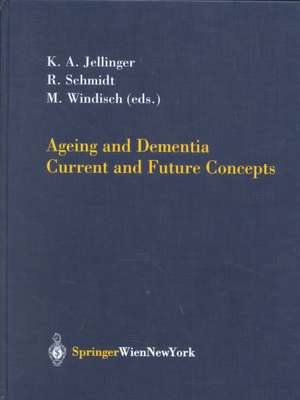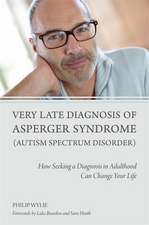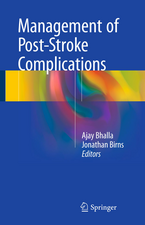Ageing and Dementia: Current and Future Concepts
Editat de Kurt Jellinger, Reinhold Schmidt, Manfred Windischen Limba Engleză Hardback – 20 aug 2002
| Toate formatele și edițiile | Preț | Express |
|---|---|---|
| Paperback (1) | 1428.71 lei 43-57 zile | |
| SPRINGER VIENNA – 20 aug 2002 | 1428.71 lei 43-57 zile | |
| Hardback (1) | 1356.43 lei 38-44 zile | |
| SPRINGER VIENNA – 20 aug 2002 | 1356.43 lei 38-44 zile |
Preț: 1356.43 lei
Preț vechi: 1427.82 lei
-5% Nou
Puncte Express: 2035
Preț estimativ în valută:
259.62€ • 267.55$ • 219.18£
259.62€ • 267.55$ • 219.18£
Carte tipărită la comandă
Livrare economică 26 februarie-04 martie
Preluare comenzi: 021 569.72.76
Specificații
ISBN-13: 9783211837979
ISBN-10: 3211837973
Pagini: 384
Ilustrații: VIII, 384 p.
Dimensiuni: 210 x 279 x 29 mm
Ediția:2002
Editura: SPRINGER VIENNA
Colecția Springer
Locul publicării:Vienna, Austria
ISBN-10: 3211837973
Pagini: 384
Ilustrații: VIII, 384 p.
Dimensiuni: 210 x 279 x 29 mm
Ediția:2002
Editura: SPRINGER VIENNA
Colecția Springer
Locul publicării:Vienna, Austria
Public țintă
ResearchCuprins
Vascular-ischemic dementia: an update.- Frequency of white matter lesions and silent lacunar infarcts.- CT and MRI rating of white matter changes.- Risk factors and progression of small vessel disease-related cerebral abnormalities.- Microangiopathy-related cerebral damage and angiotensinogen gene: from epidemiology to biology.- Can small-vessel desease-related cerebral abnormalities be used as a surrogate marker for vascular dementia trials?.- Reactive oxygen: its sources and significance in Alzheimer disease.- Dysregulation of neuronal differentiation and cell cycle control in Alzheimer’s disease.- A broader horizon of Alzheimer pathogenesis: ALZAS — an early serum biomarker?.- Is mild cognitive impairment bridging the gap between normal aging and Alzheimer’s disease?.- Vienna Transdanube Aging “VITA”: study design, recruitment strategies and level of participation.- Conversion from preclinical to clinical stage of Alzheimer’s disease as shown by decline of cognitive function in carriers of the Swedish APP-mutation.- The role of biological markers in the early and differential diagnosis of Alzheimer’ disease.- Measuring cognition in advanced Alzheimer’s disease for clinical trials.- Current drugs and future hopes in the treatment of Alzheimer’r disease.- Development of human antibody fragments directed towards synaptic acetylcholinesterase using a semisynthetic phase display library.- Long-term stabilizing effect of cholinesterase inhibitors in the therapy of Alzheimer’ disease.- Impact of muscarinic agonists for successful therapy of Alzheimer’s disease.- Nicotinic receptor modulation: advantages for successful Alzheimer’s disease therapy.- Glutamate receptors as a target for Alzheimer’s disease — are clinical results supporting thehope?.- Can estrogen play a significant role in the prevention of Alzheimer’s disease?.- Neurotrophic factors and Alzheimer’s disease: are we focusing on the wrong molecule?.- Nerve growth factor and cholinergic CNS neurons studied in organotypic brain slices.- Sustained improvement of cognition and global function in patients with moderately severe Alzheimer’s disease: a double-blind, placebo-controlled study with the neurotrophic agent Cerebrolysin®.- Improved global function and activities of daily living in patients with AD:.a placebo-controlled clinical study with the neurotrophic agent Cerebrolysin®.- Genomics and dementia — new drug targets ahead?.- Are ?-sheet breaker pertides dissolving the therapeutic problem of Alzheimer’s disease?.- Glycoxidative stress creates a vicious cycle of neurodegeneration in Alzheimer’s disease — a target for neuroprotective treatment strategies?.- Pharmacological targets to inhibit Alzheimer neurofibrillary degeneration.- Generation and brain delivery of anti-aggregating anti-bodies against ?-amyloid plaques using phage display technology.- Effects of Cerebrolysin™ on amyloid-? deposition in a transgenic model of Alzheimer’s disease.- Vitamin E binding protein Afamin protects neuronal cells in vitro.- Recent developments in the pathology of Parkinson’s disease.












